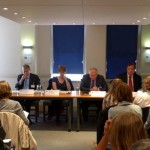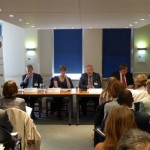The Independent Commission for Aid Impact (ICAI) was founded in May 2011 to maximise the effectiveness of the UK aid budget for intended beneficiaries and to ensure value for money for British taxpayers. ICAI is independent of government and reports to a sub-committee of the House of Commons’ International Development Committee (IDC). After four years and 45 reports, the commissioners handed over to a new team on 1 July.
On Thursday 11 June 2015, ARI hosted the outgoing commissioners for the launch of the report, “How DFID works with multilateral agencies to achieve impact”, which was scored ‘Green-Amber’. Previous ICAI reviews have highlighted DFID’s limited oversight of EU aid, while commending its engagement with the World Bank. The three commissioners also reflected on their time in office and the significant challenges facing DFID.
Graham Ward CBE, Chief Commissioner, on DFID’s key challenges:
- Economic development: The Secretary of State has pledged to spend £1.8 billion on frontier economic development this year, but DFID must improve its work in this domain. ICAI rated as ‘Amber-Red’ both DFID’s work with the private sector and its approach to partnering with business. If DFID’s economic programmes are to have impact, interventions at different levels – such as microfinance, making markets work for the poor, and regulatory reform – must be coordinated so that they form mutually reinforcing portfolios.
- Fragile states: DFID is committed to spending 30% of its budget in countries affected by conflict, which necessitates expertise in fragile states. Yet, ICAI’s review of the scaling up of DFID support to fragile states highlighted unrealistic ambitions and excessively complex delivery methods. DFID needs to balance “quick wins” with programming designed to promote long-term pathways out of fragility.
- Emergency response: ICAI has been impressed by DFID’s humanitarian portfolio. DFID played a leading role in the response to the 2011 food crises in the Horn of Africa, achieving good impact and value for money. Yet, DFID remains weaker at responding to long-term or chronic emergencies, where humanitarian and development assistance are needed in parallel.
- Short-termism: Numerous ICAI reviews have found that DFID’s 3-5 year programme cycle can undermine the achievement of long-term, transformative impact. Internal evaluations are not timed to fit the programming cycle with the result that information on results is rarely available in time to inform the next phase of programming.
Commissioner Diana Good on DFID’s project management:
- Results agenda: An unintended consequence of DFID’s results agenda is a trade-off whereby programmes focus on quantity, rather than quality. School enrolment figures tell us little about educational attainment, or even whether there are sufficient teachers in the classroom; yet such metrics lie at the heart of the results agenda.
- Joined-up thinking: DFID’s management systems neither encourage, nor capture, portfolios of projects and more complex results. In Tanzania, private sector development programmes were presented as a list rather than integrated in a comprehensive multi-level strategy. It is hoped that DFID’s country diagnostic tool will improve this picture.
- Beneficiary focus: ICAI believes DFID’s best work stems from quality engagement with beneficiaries via existing community structures. Beneficiaries must be involved in programme design, problem-solving during implementation, and evaluation. In the case of TradeMark Southern Africa, the only report to which ICAI has awarded a ‘Red’ traffic light, DFID lost sight of the imperative to benefit the poor. As a result of poor management, this programme was closed.
Commissioner Mark Foster on how DFID works with multilaterals:
- A plethora of agencies: DFID spends 62.9% of its annual budget via 47 multilaterals. Alongside the World Bank group and the EU, DFID works with 22 UN agencies, 7 global funds, 6 regional development banks, and numerous international organisations. The proliferation of multilaterals has been unaccompanied by efforts to address their lack of coordination. Effective coalitions need to be formed around specific issues to achieve meaningful impact.
- Global presence: Multilateral agencies possess a global footprint and legitimacy which enables them to work in contexts where national governments cannot. UNICEF played a critical role in maintaining the education system in Madagascar when bilateral donors pulled out. However, staff in conflict-affected states are often constrained by operating procedures. ICAI met a WHO nutrition expert in Somalia who had not left the compound for 18 months.
- Norms and practices: Multilaterals help shape global development by diffusing norms, especially relating to women, youth and nutrition. DFID has a reputation as a “thought leader”, but recently it has focused less on agencies’ strategic priorities, and more on their processes. ICAI fears that if this trend continues, DFID risks prioritising due diligence over selecting the organisation which is best equipped to deliver with impact.
- Strategy and communication: DFID is expected to award £35 billion to multilaterals over the next five years, but there appears to be no overarching strategy to determine which agencies should receive funding, nor did ICAI identify clear country-level strategies for DFID’s work with multilaterals. DFID must do more to spell out why the UK invests so heavily with these agencies, and communicate their successes to the public.
Romilly Greenhill (ODI), responding to the report:
- Contextual changes: African governments are increasingly able to choose from a number of finance sources, but multilaterals have been slow to adapt to this trend. The Chinese are able to deliver infrastructure projects much more quickly than the development banks; while Eurobonds have proved a popular alternatives to the banks’ concessional loans – as ARI’s recent publication ‘Africa [Debt] Rising’ documented.
- Reform to remain relevant: The governance of the Bretton Woods institutions and regional development banks remains skewed in favour of donor governments. DFID should not have such a big seat at the table. These institutions must reform their governance if they want to remain relevant. Otherwise alternative structures will be established, similar to the BRICS’ New Development Bank and the Asian Infrastructure Bank.
- Assessment: DFID must improve its collaboration with other bilateral donors in assessing the work of multilaterals. A draft of the OECD report Multilateral Aid 2015 revealed that 205 bilateral assessments of multilateral agencies were carried out in 2014/15, including 17 of UNDP alone. DFID could do more to use the findings of the Multilateral Organisation Performance Assessment Network (MOPAN), which it co-funds, to inform decision-making.














